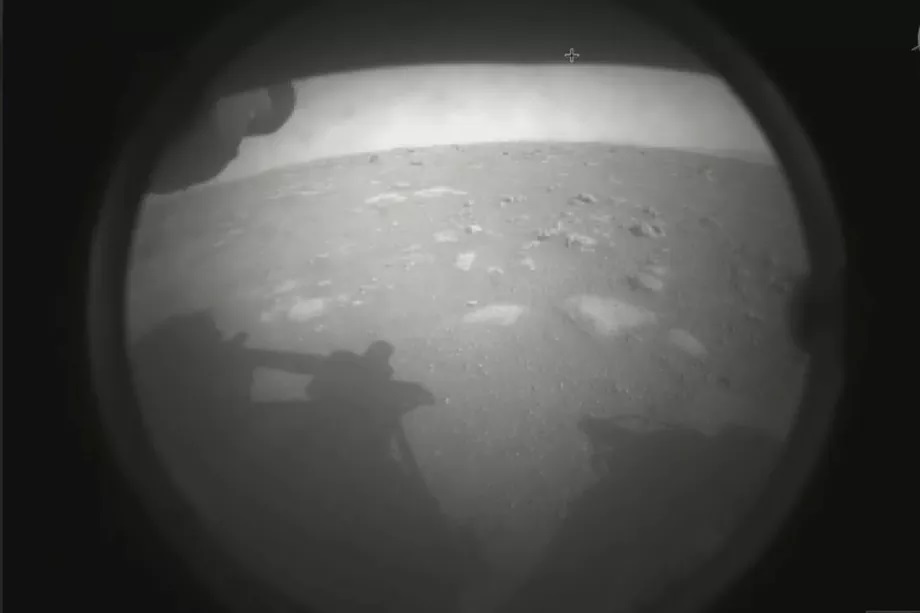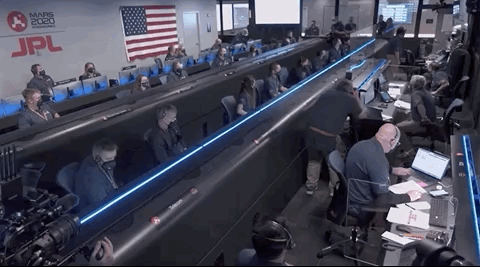Perseverance survived the ‘seven minutes of terror’

NASA/JPL
NASA’s Perseverance rover has successfully touched down on the surface of Mars after surviving a blazing seven-minute plunge through the Martian atmosphere. The rover’s clean landing sets the stage for a years-long journey to scour the Red Planet’s Jezero Crater for ancient signs of life.

GIF: NASA / JPL
“Touchdown confirmed,” Swati Mohan, a member of NASA’s Entry, Descent, and Landing team, said. “Perseverance is safely on the surface of Mars ready to begin seeking the signs of past life.” The landing team of roughly 30 engineers at NASA’s Jet Propulsion Laboratory in California jumped from their seats and cheered at the confirmation. Moments after touching down, Perseverance beamed back its first image from one of its 19 cameras.
Perseverance hit Mars’ atmosphere on time at 3:48PM ET at speeds of about 12,100 miles per hour, diving toward the surface in an infamously challenging sequence engineers call the “seven minutes of terror.” With an 11-minute comms delay between Mars and Earth, the spacecraft had to carry out its seven-minute plunge at all by itself with a wickedly complex set of pre-programmed instructions.
Enduring blazing heat, the rover was shielded by a protective shell and parachute to help slow itself down. A descent stage with six rocket thrusters fired as it neared the surface, slowing Perseverance to a much calmer 2 mph. Clutching the rover, the descent stage hovered 66 feet above the surface to execute a “skycrane” maneuver, where it gently lowered Perseverance on a set of cables the rest of the way to the surface.
With its six wheels planted on the surface, the rover snipped the skycrane cables, prompting the rocket-powered descent stage to move itself far away from Perseverance.
The on-time landing at 3:55PM ET marks NASA’s sixth successful landing on the Red Planet. The $2.7 billion rover is essentially a 2,263-pound laboratory on wheels: for the next several years, Perseverance will traverse Mars’ Jezero Crater to collect soil samples for a future retrieval mission, analyze the makeup of Martian rocks with a laser-beaming camera system, and deploy a helicopter named Ingenuity, a four-foot-on wide rotorcraft that will demonstrate the first powered flight on another planet.
The SUV-sized rover has traveled 293 million miles since launching last summer atop an Atlas V rocket from United Launch Alliance. It launched during a slim window of time as Earth and Mars closely aligned in their orbits around the Sun. That alignment only comes once every two years, and NASA launched its rover around the same time as China and UAE, whose Martian spacecraft also reached the planet earlier this month. China’s Tianwen-1 probe, which arrived in Martian orbit on February 10th, will deploy a lander and rover in the coming months, joining Perseverance just over a thousand miles away on Mars’ surface.
Perseverance’s journey through space was even more uneventful than expected. Toward the end of its seven-month journey, Perseverance’s cruise stage carried out fewer orbital correction maneuvers than originally planned, in part due to an ultra-precise insertion on its Mars trajectory when it launched. “When we hit the bullseye, that means they had a ton more propellant” that NASA didn’t have to use on its journey to Mars, ULA CEO Tory Bruno told The Verge. Unlike Tianwen-1, which is hanging out in orbit before heading to the surface, Perseverance booked it straight for the surface upon reaching Mars.
The Jezero Crater posed the most challenging landing site NASA has faced. Perseverance had to steer clear of the crater’s steep cliffs, massive boulders, and dangerously sandy pits to reach its landing spot. Scientists believe the 28-mile-wide hole was a river delta some 3.5 billion years ago — potentially a goldmine for fossilized microorganisms. Its mix of different rock formations offers researchers a smorgasbord of potential samples to collect during its mission.




